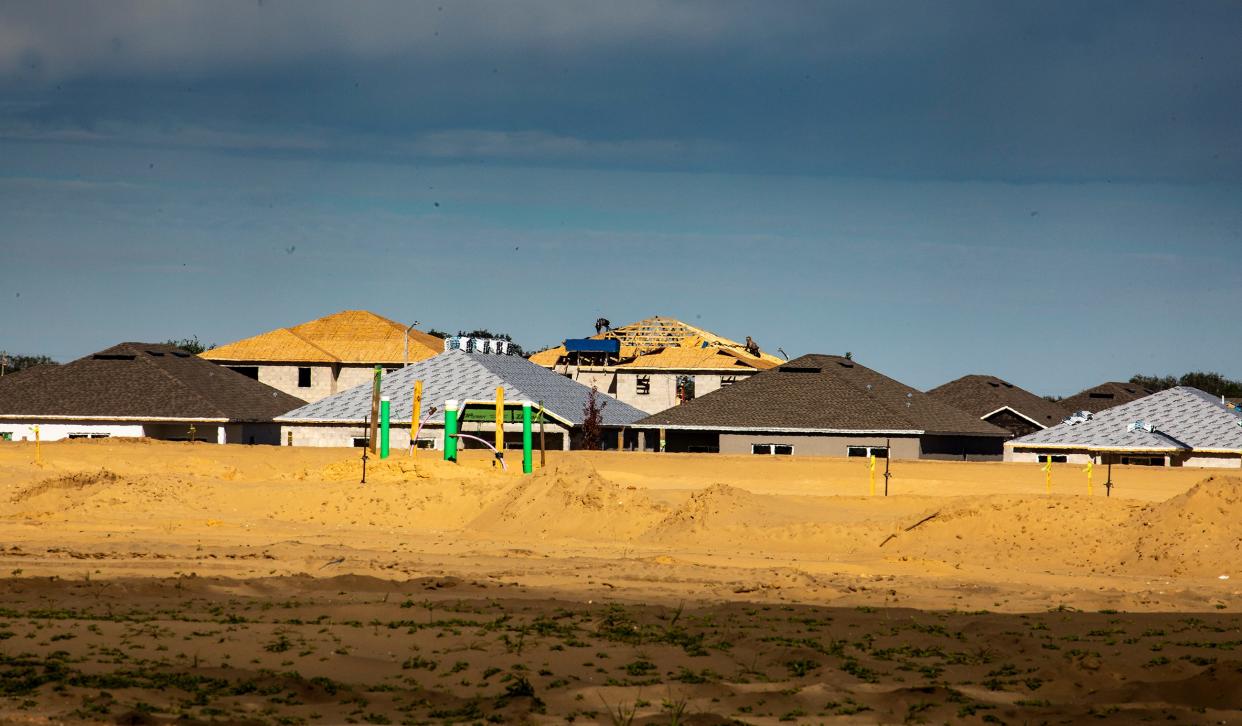Polk commissioners will vote on increasing impact fees by more than state law typically allows

Despite one commissioner offering a compromise, a consensus of Polk County commissioners told county staff on Tuesday to draft an ordinance that would raise impact fees for new development at rates higher than typically allowed by state law, as recommended in a recent study.
The straw poll was taken at the commission meeting Tuesday in Bartow during the second hearing on a proposed increase in impact fees to take effect Jan. 1.
Impact fees are imposed on new construction of homes or other developments. Unless there are “extraordinary circumstances,” Florida Statute caps the increases at 50% over four years.
'I can read the tea leaves'
Commissioner George Lindsey displayed a spreadsheet with lower impact fee increases for some categories or phased-in rates, but he could not convince his colleagues to go along with him.
“I can read the tea leaves, there is little sympathy to phase this in,” said Lindsey, who is a business partner with one of Polk’s largest home developers.
Impact fees usually affect new home buyers when developers pass them along in the price of the home. Lindsey has warned his fellow commissioners not to use the fees as a punitive measure to restrict growth, especially when an economic slowdown could come.
He also called the extraordinary circumstances an illusion despite the study's findings. Still, he called the state statute on impact fees onerous because the phasing in for some categories is too slow to keep up demand for public services.
The proposed impact fee increases are for parks and recreation, libraries, fire rescue, emergency medical services, law enforcement, correctional facilities and educational facilities.
His compromise was to fund at 100% of the study's recommendation for three of the categories, but he said the increases for schools and parks were too high. Others he wanted to be phased in over several years but for less time than the four years prescribed by law.
Regarding the school fee, Lindsey noted that the district had some schools with capacity and available classroom seats. The school district is currently phasing in redistricting of its schools to fill those vacant desks.
More growing pains: Lack of sewer capacity could delay 30 developments in Auburndale
Lindsey said he was also surprised by a 347% increase in the parks and recreation fee.
In an earlier work session, Commissioner Neil Combee had said the fee for parks and recreation did seem high, but he said Tuesday that he wanted his grandkids to have places to enjoy. He also felt like current parks are difficult to access because of a lack of sidewalks, so he was in support of raising that category.
Keeping up with infrastructure and public services in Polk County
If the ordinance passes unaltered, it would be a combined 58% increase for all six categories, taking total impact fees from the current $13,365 to $21,083 for a typical single-family home, according to Todd Bond, deputy county manager for support and human services.
The study by Benesch showed the county needed to raise six impact fees to afford the infrastructure and public service demands for new residential and commercial developments.
The study noted Polk’s rising costs to build infrastructure for public services such as libraries, fire rescue, EMS, law enforcement and correctional facilities and equipment.
The seventh fee is for transportation, and its increase was enacted in March 2023. It is following the normal process with incremental five-year increases until it's 50% higher than the initial level.
“With a population of over 800,000, Polk County ranks 9th out of 67 Florida counties in terms of population,” the study's supplemental report said. “The county has been experiencing significant growth over the past four years and continues to experience significant growth."
The U.S. Census Bureau reported, “Polk County ranked 7th in the nation in terms of population added in 2021 and 5th in 2022 and 2023. ... Growth projections provided by the University of Florida's Bureau of Business and Economic Research suggest approximately 300,000 additional residents through 2050."
BizLinc: New audit finds Lake Wales' business incubator surpassed most contract benchmarks in second year
In data from the county’s Building Division, Director Benjamin A. Dunn said that there were 3,000 permits issued for single-family homes in unincorporated Polk County in fiscal year 2018-2019. By 2021-2022, they maxed out a 5,080. This fiscal year, the permits are projected to be the lowest in six years at 2,900.
For all permits combined, including commercial buildings, there was a steady rise from 2018-19, when there were 27,948 permits, to 36,772 permits in 2022-23 at 36,772, Dunn said. This year, the county projects 29,600 permits.
To circumvent the normal process for increasing impact fees, the commission had to conduct the study, which was delivered in August, hold two workshops and then vote in favor or implementing 100% of the recommendations by a two-third's majority – or a 4-1 vote.
A vote on the impact fee increase ordinance will be held at the board’s Sept. 17 meeting. The last Impact Fee Study was in 2019.
This article originally appeared on The Ledger: Polk moves forward with plan to raise impact fees on new development
